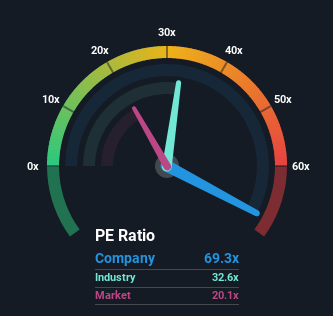Stock Analysis
Is It Too Late To Consider Buying Maruti Suzuki India Limited (NSE:MARUTI)?

Maruti Suzuki India Limited (NSE:MARUTI) received a lot of attention from a substantial price movement on the NSEI over the last few months, increasing to ₹8,949 at one point, and dropping to the lows of ₹6,769. Some share price movements can give investors a better opportunity to enter into the stock, and potentially buy at a lower price. A question to answer is whether Maruti Suzuki India's current trading price of ₹7,439 reflective of the actual value of the large-cap? Or is it currently undervalued, providing us with the opportunity to buy? Let’s take a look at Maruti Suzuki India’s outlook and value based on the most recent financial data to see if there are any catalysts for a price change.
Check out our latest analysis for Maruti Suzuki India
Is Maruti Suzuki India still cheap?
According to my price multiple model, where I compare the company's price-to-earnings ratio to the industry average, the stock currently looks expensive. I’ve used the price-to-earnings ratio in this instance because there’s not enough visibility to forecast its cash flows. The stock’s ratio of 69.26x is currently well-above the industry average of 32.64x, meaning that it is trading at a more expensive price relative to its peers. In addition to this, it seems like Maruti Suzuki India’s share price is quite stable, which could mean two things: firstly, it may take the share price a while to fall back down to an attractive buying range, and secondly, there may be less chances to buy low in the future once it reaches that value. This is because the stock is less volatile than the wider market given its low beta.
What kind of returns can we expect from Maruti Suzuki India in the future?

What kind of returns can we expect from Maruti Suzuki India in the future? It’s one thing to get a stock at a low price, but the quality of the company is even more important, as its stock may be cheap or expensive for a reason. We can determine the quality of a stock many ways; one way is to look at how much return it generates relative to the money we’ve invested in the stock. Maruti Suzuki India is expected to return 10% of your investment in the upcoming year if you buy the stock today. This is a relatively good return on your investment which builds up the case for owning the stock.
What this means for you:
Are you a shareholder? MARUTI’s optimistic future returns appear to have been factored into the current share price, with shares trading above industry price multiples. At this current price, shareholders may be asking a different question – should I sell? If you believe MARUTI should trade below its current price, selling high and buying it back up again when its price falls towards the industry PE ratio can be profitable. But before you make this decision, take a look at whether its fundamentals have changed.
Are you a potential investor? If you’ve been keeping tabs on MARUTI for some time, now may not be the best time to enter into the stock. The price has surpassed its industry peers, which means it is likely that there is no more upside from mispricing. However, the positive outlook is encouraging for MARUTI, which means it’s worth diving deeper into other factors in order to take advantage of the next price drop.
With this in mind, we wouldn't consider investing in a stock unless we had a thorough understanding of the risks. To help with this, we've discovered 4 warning signs (1 can't be ignored!) that you ought to be aware of before buying any shares in Maruti Suzuki India.
If you are no longer interested in Maruti Suzuki India, you can use our free platform to see our list of over 50 other stocks with a high growth potential.
Valuation is complex, but we're helping make it simple.
Find out whether Maruti Suzuki India is potentially over or undervalued by checking out our comprehensive analysis, which includes fair value estimates, risks and warnings, dividends, insider transactions and financial health.
View the Free AnalysisHave feedback on this article? Concerned about the content? Get in touch with us directly. Alternatively, email editorial-team (at) simplywallst.com.
This article by Simply Wall St is general in nature. We provide commentary based on historical data and analyst forecasts only using an unbiased methodology and our articles are not intended to be financial advice. It does not constitute a recommendation to buy or sell any stock, and does not take account of your objectives, or your financial situation. We aim to bring you long-term focused analysis driven by fundamental data. Note that our analysis may not factor in the latest price-sensitive company announcements or qualitative material. Simply Wall St has no position in any stocks mentioned.
About NSEI:MARUTI
Maruti Suzuki India
Manufactures, purchases, and sells motor vehicles, components, and spare parts primarily in India.
Solid track record with excellent balance sheet and pays a dividend.

